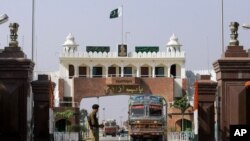Pakistan removed a nearly two-year old ban on the import of cotton and sugar from India Wednesday amid a gradual thawing of relations between the two nuclear-armed rival neighbors.
Finance Minister Hamad Azhar told reporters in Islamabad that his government has allowed importers to urgently procure cotton and 500,000 tons of white sugar from Indian suppliers to keep soaring domestic prices under control.
“Sugar prices are comparatively much lower in India, so we have decided to reopen sugar trade with India and have allowed the private sector to import 500,000 tons,” Azhar said after chairing a meeting of the decision-making federal Economic Coordination Committee.
“It will improve supplies here (in Pakistan) and overcome a temporary shortage in the country, and help lower soaring sugar prices,” he added.
Azhar defended the decision, saying “there is no harm in reopening trade” with India if it helps bring down prices for economically burdened Pakistanis. He said that “if the situation required” the government may also decide to lift ban on other imports from India.
Pakistan was a leading buyer of Indian cotton until August 2019, when Islamabad banned imports of goods from the neighboring country to protest New Delhi’s revocation of the semiautonomous status of Indian-administered Kashmir.
The Himalayan region is split between India and Pakistan. Both claim all of Kashmir and have fought two wars over it since the two countries gained independence from Britain in 1947.
“India desires normal relations, including on trade with all countries, including Pakistan,” Hardeep Singh Puri, India’s minister of state for commerce and industry, told the Indian parliament last week, in reply to a question on whether bilateral trade is likely to resume.
“Pakistan unilaterally suspended bilateral trade with India in August 2019. It is for Pakistan to review its unilateral measures on trade,” said Puri.
Wednesday’s decision by Pakistan to partially reopen bilateral trade came a day after Prime Minister Imran Khan replied to his Indian counterpart’s letter, saying the people of Pakistan “desire peaceful, cooperative relations” with India.
“We are convinced that durable peace and stability in South Asia is contingent upon resolving all outstanding issues between India and Pakistan, in particular the Jammu & Kashmir dispute,” Khan wrote.
Indian Prime Minister Narendra Modi in his letter sent last week extended greetings to Pakistan on the occasion of the country’s national day.
“As a neighboring country, India desires cordial relations with the people of Pakistan. For this, an environment of trust, devoid of terror and hostility, is imperative,” Modi wrote.
The exchange of goodwill messages and resumption of limited trade come a month after Indian and Pakistani military commanders announced unexpectedly that they were immediately halting hostilities along their de facto Kashmir frontier to reinstate a 2002 cease-fire there.
The flurry of peace gestures, say analysts, visibly eased tensions and reduced rhetoric from both India and Pakistan.
"It looks as if an attempt at a calibrated thaw between India and Pakistan is underway,” said Amit Baruah, New Delhi resident editor at The Hindu newspaper.
“However, while I wish all success to the fresh attempts at building bridges between the two estranged neighbors, there are grave doubts about whether the (military) establishments in Pakistan and India actually want peace,” Baruah said.
It is widely perceived that whenever Pakistani and Indian political leadership have moved toward better relations in the past, military institutions on both sides allegedly scuttled such moves.
Pakistani military chief Gen. Qamar Javed Bajwa earlier this month offered an olive branch to India by stressing the need to “bury the past and move forward.”
“But for resumption of peace process, or meaningful dialogue, our neighbor will have to create a conducive environment, particularly in Indian-occupied Kashmir,” Bajwa told an international conference of experts and academics in Islamabad.
Anjana Pasricha contributed from New Delhi.




